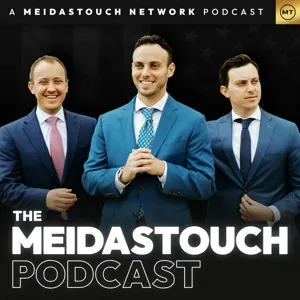Podcast Summary
Simplifying Business Operations and International Money Management: Mercury and Wise offer solutions for managing financial workflows and international currency transactions respectively, emphasizing simplicity and transparency. Hillary Clinton values realism and preparation in her approach to policy and politics.
Simplicity and precision are key to successful business operations and international money management. Mercury and Wise are two companies that offer solutions for managing financial workflows and international currency transactions respectively, with a focus on simplicity and transparency. In the political sphere, Hillary Clinton, the presumptive Democratic nominee for president, values realism and preparation in her approach to policy and politics. During an interview on The Ezra Klein Show, Clinton discussed her views on the economy, health care, and her agenda in detail, providing insights into her policy-making process. Overall, the conversation highlighted the importance of understanding context and having a clear plan in order to navigate complex issues, whether in business or politics.
Addressing Child Poverty Requires a Multi-Faceted Approach: Former Secretary of State Hillary Clinton believes that addressing child poverty requires financial support and proven interventions like early childhood education, nutrition, and healthcare.
Former Secretary of State Hillary Clinton believes that addressing child poverty in the United States is a critical issue that requires a multi-faceted approach. While acknowledging that progress was made in reducing poverty during her time in the 1990s, she believes that policies implemented since then have contributed to an increase in childhood poverty. Clinton emphasized the importance of financial support for families, but also highlighted the need for proven interventions such as early childhood education, nutrition, and healthcare. She expressed her belief that we need to do more to support families on both financial and non-financial fronts. When asked about the shift towards supporting the working poor, Clinton acknowledged that progress has been made but expressed her concern that we do too little to support those who cannot find or keep a job. She emphasized the importance of looking at how we can effectively implement policies that have worked in other countries, such as universal child allowances, while also considering the unique challenges and context of the American federal system.
Welfare reform incomplete due to budget decisions, poverty remains: Despite welfare reform efforts, poverty persists in long-impoverished areas. Debate on investing in poverty alleviation using negative interest rates continues.
The welfare reform of the early 2000s, which aimed to provide a safety net for the working poor and those in generational poverty, has not been fully implemented due to budget decisions made after 2001. As a result, poverty remains a significant issue, particularly in communities that have been impoverished for decades. Congressman Jim Clyburn's "10, 20, 30" approach is one proposed solution to target federal funds to these areas. However, there is a debate on how to pay for these investments. With short-term interest rates on US government debt being negative, some argue that now is the time to take advantage of "free money" and invest in infrastructure, poverty alleviation, and middle-class tax cuts. Others caution that entitlement issues must still be addressed. Ultimately, finding ways to pay for these investments while ensuring that the gains are not just for the wealthy is crucial.
Boosting Economic Growth through Job Creation and Fairness: Focus on job creation, fund it through tax increases on the wealthy, address the situation of undocumented immigrants for economic growth and fairness.
While corporate profits are rising, many Americans are struggling with stagnant or declining real family income. To boost economic growth, the focus should be on job creation. The government can fund these efforts by implementing tax increases on the wealthy. This approach not only addresses budget concerns but also promotes distributional fairness in the wake of the recession. The economic benefits of immigration are well-documented, particularly as the population ages. However, it's crucial to address the human cost of the 11 million undocumented immigrants already in the country. They are contributing members of society, and addressing their situation requires understanding and compassion. In summary, economic growth and fairness go hand in hand, and addressing the needs of both corporations and individuals, as well as the undocumented immigrant population, is essential for a strong and equitable economy.
Immigration reform benefits economy and values: Undocumented workers contribute to economy, deportation leads to job losses, and comprehensive reform addresses concerns for necessary workers and those in fear. Keep focus on reform, invest in American workers, and address all sides of the debate.
Comprehensive immigration reform with a path to citizenship is beneficial for both the economy and American values. Undocumented workers contribute billions to the Social Security trust fund through payroll taxes, and their deportation would lead to job losses and economic growth depression. A comprehensive reform would address the concerns of both workers filling necessary jobs and those living in fear. However, it's essential not to mix immigration reform with other concerns, such as visa changes, to keep the focus on resolving the larger issue. Additionally, American corporations must invest in training American workers instead of relying on foreign labor as a cost-cutting measure. Despite economic evidence showing that immigrants do not always compete for jobs in a zero-sum way, many people believe they do due to personal experiences or stories of job loss. It's crucial to address all sides of the immigration debate to ensure a fair and effective solution.
Understanding the Complexity of Immigration's Impact on Employment: Acknowledge real-world experiences and emotions, remember undocumented workers are people, and support businesses offering affordable solutions
The issue of immigration and its impact on employment is a complex issue with valid concerns on both sides. While some argue that economic growth and investments outweigh any potential job displacement, others have firsthand experiences of losing their jobs due to the undercutting of wages by undocumented workers. It's crucial to acknowledge the real-world experiences and emotions behind the anxiety and not just focus on abstract economic arguments. Additionally, it's important to remember that undocumented workers are people with their own stories and struggles, while employers who hire them without accountability create a gray area in the labor market. Mint Mobile's secret sauce lies in their online-only business model, allowing them to offer affordable wireless plans, while Wise simplifies international money transfers with no hidden fees and real-time exchange rates.
Warren discusses hybrid approach to education and healthcare policies: Warren advocates for investing in public education and subsidizing college, while encouraging states to reinvest, and prefers building on Obamacare for universal healthcare.
During the debates, Elizabeth Warren discussed her stance on universal policies versus targeted ones, using the example of higher education. She argued for a hybrid system of public and private education, with subsidies for both, but emphasized the importance of investing in public education. Warren expressed concerns about Bernie Sanders' proposal for free college, as it would rely heavily on state and federal funding and could be expensive to implement, especially in states that have historically disinvested in higher education. Instead, Warren suggested subsidizing college as much as possible while encouraging states to reinvest in their education systems. Additionally, Warren expressed her preference for building on Obamacare to achieve true universal healthcare coverage, but acknowledged that her current plan does not fully accomplish this goal yet.
Progress under Obamacare: 20 million covered, $2.6 trillion in savings: Build on Obamacare's success by encouraging competition, addressing drug costs, and considering a public option with price negotiation
The Affordable Care Act (ACA), also known as Obamacare, has made significant progress in covering more people and reducing healthcare spending. With 20 million people now insured and $2.6 trillion in savings since implementation, the focus should be on building on this progress rather than starting over. This can be achieved by encouraging competition among insurers, addressing rising prescription drug costs, and considering a public option with the ability to negotiate prices. The speaker emphasizes the importance of learning from past successes and making adjustments as needed. Effective governance requires the ability to tackle complex issues through persistent effort and compromise.
Emphasizing the importance of finding common ground and never giving up on negotiations: Effective political leadership requires consistent effort and relationship-building, even with adversaries. Persist through challenges and seize opportunities to push forward on multiple issues.
Effective political leadership requires consistent effort and relationship-building, even with political adversaries. Hillary Clinton emphasized the importance of finding common ground and never giving up on negotiations, even during contentious times. She highlighted President Obama's ability to seize opportunities during major national disasters and push forward on multiple issues simultaneously. However, she also acknowledged the rise in partisanship and division, attributing it to the media environment, particularly social media, which drives negativity and captures people's attention. Despite the challenges, Clinton emphasized the importance of persistence and continued effort in getting things done.
Maintaining Confidence Amidst Negative Attacks: Hillary Clinton emphasizes the importance of listening, working together, and reading insightful books to overcome negative campaigns and make a positive impact.
Despite facing negative attacks and a divisive political climate, Hillary Clinton remains confident in her ability to win elections and make a positive impact. She has experienced high approval ratings in her previous roles, but negative campaigns emerge during her bids for office. She emphasizes the need for people to listen to each other and work together to solve problems, rather than being pulled into negative campaigning. Clinton recommends reading books like "Our Kids" by Robert Putnam and "It Takes a Village" by herself to gain insights on policy and the importance of community.
Political Divide and Media's Role in Rebuilding Trust: Politicians spend less time engaging, media rewards outrage, contributes to loss of trust in institutions including media, media must be straightforward and admit mistakes to help rebuild trust.
The current political climate in Washington, D.C. is deeply divided, with politicians spending less time engaging with each other than in the past. This divide is exacerbated by the media environment, where people are rewarded for being outrageous and unaccountable for spreading misinformation. This has contributed to a loss of trust in institutions, including the media, which is essential for a functioning democracy. The media, along with other institutions, must take responsibility for being straightforward and admitting when they get things wrong to help rebuild that trust.
Importance of admitting mistakes and rebuilding trust: Authenticity and accountability are crucial for rebuilding trust. Admitting mistakes and correcting them transparently can restore faith in leaders and institutions.
Admitting mistakes and correcting them in a transparent and factual manner is crucial for rebuilding trust, whether in politics, business, or media. As former Secretary of State Hillary Clinton emphasized, there should be consequences for inaccuracies and a reward for getting it right. However, she noted that this admission can be threatening and difficult to do. It requires a matter-of-fact approach and a willingness to share new information. Clinton's sentiment highlights the importance of authenticity and accountability in restoring trust in our leaders and institutions. Additionally, I want to express my gratitude to Secretary Clinton for her time, to Hillary Clinton's team at ox.com, and to AC Valdez and Joe Posner for their contributions to this podcast.




